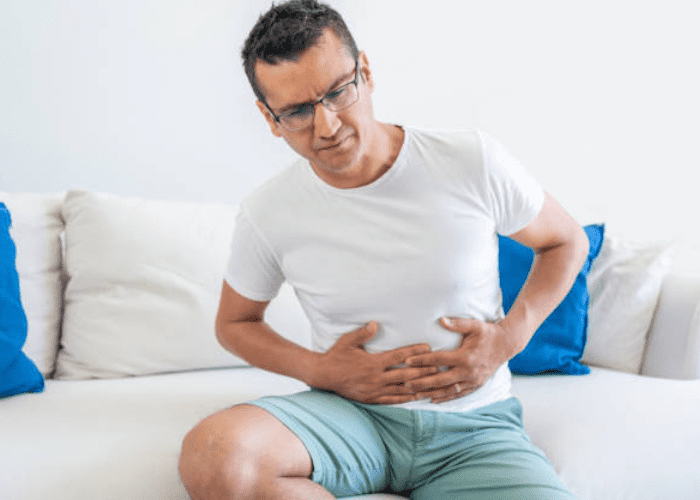How do you know if you have a stomach ulcer or some other type of stomach problem?
If you have discomfort between meals or during the night, you could have a duodenal ulcer. If you have discomfort when you eat and drink, this could be a gastric ulcer. If you feel full quickly, have bloating and dull pain in your stomach, a discomfort that can last for minutes or hours.
What is the best way to sleep with an ulcer?

On your left-hand side. It may be the case that your stomach ulcer is causing acid reflux, making it very hard to get a good night’s sleep.
Sleeping on your left-hand side will help keep the contents of your stomach where they should be instead of rising into your esophagus and mouth. Gravity will assist in keeping the stomach acid in your stomach.
You can also elevate your bed and use pillows under the mattress for the best results. This again is to use gravity to keep the contents of your stomach where they belong.
If acid reflux is not your issue, but stomach pain, take antacids. They will provide short-term relief and allow you to sleep.
Take pain relievers, such as Ibuprofen. This should dull the pain sufficiently to allow you to sleep.
Why is ulcer pain worse at night?
Various reasons. You are in a lying position on your side or back is not the ideal position for people who have stomach ulcers.
You may not have digested your evening meal, so more acid in your stomach can cause pain to the ulcer or cause acid reflux.
Other hormones in your body are subsiding, so the pain will become more noticeable.
Do ulcers hurt worse when you lay down?
Yes, Particularly if you have undigested food in your stomach, your stomach will be full of acid, which you can regurgitate.
To try and reduce some of the symptoms of ulcers before you lay down, take antacids, don’t eat your last meal of the day late in the day, and don’t snack between meals.
How do you relax a stomach ulcer?
Changing your diet will help significantly. If you have a bad diet of fast foods, oily foods, or spicy foods, your ulcer will cause you continual problems, so it’s a case of changing up your diet to live healthily.
Here are a few things that will help with your stomach ulcer:
- Take probiotics. They are good for your gut and can add good bacteria to your stomach flora, relieving ulcer pain.
- Eat a diet rich in flavonoids, such as broccoli, apples, cranberries juice and green tea, legumes, soybeans, red grapes, and many more healthy flavonoid-rich foods.
- Garlic, garlic has been used for centuries for its healing properties, garlic has been shown to inhibit pylori which is a root cause of your problems.
- A diet rich in fruit and vegetables will help your ulcers recover.
Is cold water good for ulcer patients?
Yes, Drinking cold water or tepid water will decrease the effects of the stomach acid secretions and should give some relief from ulcer pain.
Is rice good for ulcers?
No. What is blander than boiled rice? But the truth is that rice and carbs, in general produce a lot of stomach acid, which will cause stomach pain from the ulcer.
Avoid these other seemingly bland foods in your diet as they produce additional acid secretions:
- Tomatoes
- Citrus fruits, like lemons and oranges, and grapefruits
- White bread, white rice, and all processed foods
Your diet should be high in fiber with some carbs for energy.
Does exercise help ulcers?
Moderate exercise. There is no direct evidence to support that exercise is beneficial for ulcers, but it is known that sitting in front of the tv or computer is bad for ulcers.
By exercising moderately, you increase the body’s immune defense capabilities, which can only work in your favor with a stomach ulcer.
It is thought that exercise does have a favorable effect on acid secretions.
What is the fastest way to cure a stomach ulcer?
Correct diet. While some stomach ulcers seem to linger for a long time, most other ulcers heal quickly.
You must stick to the diet and medication routine given by your doctor, which can include:
- Medication to block acid production (proton pump inhibitor)
- Antibiotics to kill the dangerous H, pylori bacteria that, when left untreated, can cause serious stomach issues
- Medications that will reduce the amount of stomach acid present in your stomach
- Neutralising antacid medication
- Medications that protect the lining of the stomach and intestine
How painful is a stomach ulcer?
It can be very painful. Stomach ulcers can be excruciating, and feel like you have a burning pain in your stomach that will not stop whatever you do.
The pain can last from a few minutes to several hours, depending on the severity of the ulcer.
The highest levels of pain tend to emerge a few hours after eating, but in some cases, you can feel the ulcer becoming irritated when eating.
Do ulcers make you hungry?
No. In most cases having an ulcer causes a loss of appetite as you try to deal with the stomach pain.
It’s not unusual to vomit with stomach ulcers which leads to pain relief as the acid is expelled from the body.
Is fasting good for ulcers?
Yes, Although fasting for one day may help a little, you should enter into prolonged fasting periods, this may allow resistive ulcers the opportunity to heal.
Can ulcers affect bowel movements?
Yes. Sometimes your stomach ulcers may bleed. It’s not a good sign. If you have a dark and tarry bowel movement, this could be a sign of blood in your stool.
If you have bowel movements that resemble the description, you should head off to the emergency room and consult a doctor.
How to reduce stomach ulcers pain
Stomach ulcers, also known as peptic ulcers, are sores that develop on the lining of the stomach or small intestine. They can be caused by a variety of factors, including infection with the bacterium Helicobacter pylori, the use of nonsteroidal anti-inflammatory drugs (NSAIDs), and stress. Ulcers can cause a range of symptoms, including abdominal pain, heartburn, and nausea.
To reduce stomach ulcer pain, you may want to try the following strategies:
- Take medication as prescribed: If you have been prescribed medication for your ulcer, such as antibiotics or acid-reducing drugs, be sure to take it as directed.
- Avoid triggers: Some foods and drinks, such as caffeine, alcohol, and spicy foods, can irritate ulcers and increase pain. Avoiding these triggers can help to reduce symptoms.
- Eat small, frequent meals: Eating smaller meals more frequently can help to reduce the amount of acid in the stomach and decrease ulcer pain.
- Avoid NSAIDs: Nonsteroidal anti-inflammatory drugs (NSAIDs) such as aspirin and ibuprofen can irritate ulcers and increase pain. If you are taking NSAIDs for another condition, talk to your healthcare provider about alternative treatment options.
- Practice stress management: Stress can exacerbate ulcer pain, so finding ways to manage stress, such as through relaxation techniques or therapy, can be helpful.
- Consider natural remedies: Some people find that certain natural remedies, such as aloe vera or slippery elm, can help to reduce ulcer pain. However, it is important to speak with a healthcare professional before trying any new treatment, as some remedies may interact with medications or have other potential risks.
If you are experiencing stomach ulcer pain, it is important to speak with a healthcare professional for proper diagnosis and treatment. They will be able to recommend the most appropriate course of action for your specific situation.





